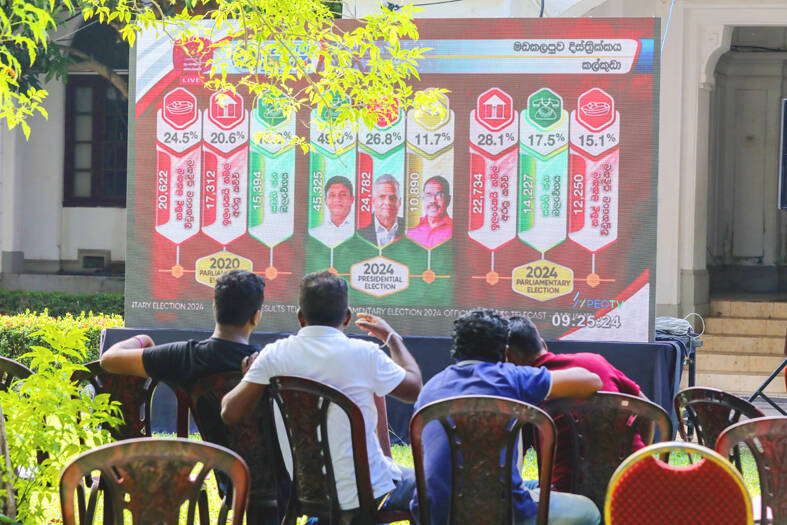The party of Sri Lankan President Anura Kumara Dissanayake yesterday won a majority in parliament, according to official election results, providing a solid mandate for his program for economic revival.
Dissanayake’s National People’s Power Party (NPP) won at least 123 of the 225 seats in parliament, according to partial results released by the Sri Lankan Elections Commission.
The Samagi Jana Balawegaya, or United People’s Power Party, led by opposition leader Sajith Premedasa, had 31 seats.

Photo: EPA-EFE
Dissanayake was elected president on Sept. 21 in a rejection of traditional political parties that have governed the island nation since its independence from British rule in 1948.
He received just 42 percent of the votes, fueling questions over his party’s outlook in Thursday’s parliamentary elections.
However, the party received large increases in support less than two months into his presidency.
In a major surprise and a big shift in the country’s electoral landscape, his party won the Jaffna district, the heartland of ethnic Tamils in the north, and many other minority strongholds.
The victory in Jaffna marks a great dent for traditional ethnic Tamil parties that have dominated the politics of the north since independence.
It is also a major shift in the attitude of Tamils, who have long been suspicious of majority ethnic Sinhalese leaders. Ethnic Tamil rebels fought an unsuccessful civil war from 1983 to 2009 to create a separate homeland, saying they were being marginalized by governments controlled by Sinhalese.
According to conservative UN estimates, more than 100,000 people were killed in the conflict.
Veeragathy Thanabalasingham, a Colombo-based political analyst, said northern voters chose the NPP because they could not find a local alternative to traditional Tamil political parties, with which they were disillusioned.
“The Tamil parties were divided and contested separately, and as a result the Tamil people’s representation is scattered,” Thanabalasingham said.
Of the 225 seats in parliament, 196 were up for grabs under Sri Lanka’s proportional representative electoral system, which allocates seats in each district among the parties according to the proportion of the votes they get.
The remaining 29 seats — called the national list seats — are allocated to parties and independent groups according to the proportion of the total votes they receive countrywide.
Voters were drawn by the NPP’s cry for change in the political culture and an end to corruption, because they perceived the parties that ruled Sri Lanka so far caused an economic collapse.
Dissanayake’s promise to punish members of previous governments accused of corruption and to recover allegedly stolen assets also raised much hope.
Jeewantha Balasuriya, 42, a businessman from the town of Gampaha, said he hopes Dissanayake and his party will use their resounding victory to rebuild the country.
“People have given them a strong mandate. I am hopeful that the NPP will use this mandate to uplift the country from the present pathetic situation,” Balasuriya said.

POLITICAL PRISONERS VS DEPORTEES: Venezuela’s prosecutor’s office slammed the call by El Salvador’s leader, accusing him of crimes against humanity Salvadoran President Nayib Bukele on Sunday proposed carrying out a prisoner swap with Venezuela, suggesting he would exchange Venezuelan deportees from the US his government has kept imprisoned for what he called “political prisoners” in Venezuela. In a post on X, directed at Venezuelan President Nicolas Maduro, Bukele listed off a number of family members of high-level opposition figures in Venezuela, journalists and activists detained during the South American government’s electoral crackdown last year. “The only reason they are imprisoned is for having opposed you and your electoral fraud,” he wrote to Maduro. “However, I want to propose a humanitarian agreement that

ECONOMIC WORRIES: The ruling PAP faces voters amid concerns that the city-state faces the possibility of a recession and job losses amid Washington’s tariffs Singapore yesterday finalized contestants for its general election on Saturday next week, with the ruling People’s Action Party (PAP) fielding 32 new candidates in the biggest refresh of the party that has ruled the city-state since independence in 1965. The move follows a pledge by Singaporean Prime Minister Lawrence Wong (黃循財), who took office last year and assumed the PAP leadership, to “bring in new blood, new ideas and new energy” to steer the country of 6 million people. His latest shake-up beats that of predecessors Lee Hsien Loong (李顯龍) and Goh Chok Tong (吳作棟), who replaced 24 and 11 politicians respectively

Young women standing idly around a park in Tokyo’s west suggest that a giant statue of Godzilla is not the only attraction for a record number of foreign tourists. Their faces lit by the cold glow of their phones, the women lining Okubo Park are evidence that sex tourism has developed as a dark flipside to the bustling Kabukicho nightlife district. Increasing numbers of foreign men are flocking to the area after seeing videos on social media. One of the women said that the area near Kabukicho, where Godzilla rumbles and belches smoke atop a cinema, has become a “real

‘WATER WARFARE’: A Pakistani official called India’s suspension of a 65-year-old treaty on the sharing of waters from the Indus River ‘a cowardly, illegal move’ Pakistan yesterday canceled visas for Indian nationals, closed its airspace for all Indian-owned or operated airlines, and suspended all trade with India, including to and from any third country. The retaliatory measures follow India’s decision to suspend visas for Pakistani nationals in the aftermath of a deadly attack by shooters in Kashmir that killed 26 people, mostly tourists. The rare attack on civilians shocked and outraged India and prompted calls for action against their country’s archenemy, Pakistan. New Delhi did not publicly produce evidence connecting the attack to its neighbor, but said it had “cross-border” links to Pakistan. Pakistan denied any connection to